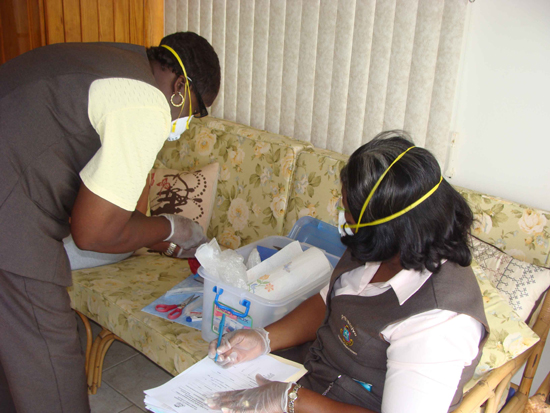 Philipsburg– The most recent pending laboratory samples from last week have come back negative, however in the meantime five additional samples taken on Tuesday, the results are still pending.
Philipsburg– The most recent pending laboratory samples from last week have come back negative, however in the meantime five additional samples taken on Tuesday, the results are still pending.
The Preventive Health Department (PHD) says with the current World Health Organization (WHO) pandemic level at phase six, the primary emphasis at this stage in pandemic flu control is, reducing its impact on the St. Maarten community.
Laboratory tests is vital to assessing the risk to public health and to monitoring and containing the spread of the flu virus. It can be difficult to distinguish flu from illnesses caused by other respiratory viruses or even bacteria by symptoms alone. Health care officials have been trained by Dr. Ruth Douglass and Van Dijk with respect to the methods used for confirming the presence of flu infection.
During the past two weeks, trained registered nurses have used swabs to obtain samples from the nose and throat which are then sent to a laboratory for analysis.
The St. Maarten community has an important role to play in reducing the impact and spread of Influenza A (H1N1) Virus. Persons with a flu-like-illness should remain at home and contact their family physician immediately.
Personal basic intervention measures that can be taken at the individual level to reduce the risk of infection are: respiratory hygiene (covering the mouth and nose with a tissue when coughing or sneezing); disposing of dirty tissues promptly and carefully (bagging and binning them); avoiding non-essential travel where possible to affected countries; hand washing frequently with soap and water (reduces acquiring the virus from contact with infected surfaces and from passing it on); cleaning hard surfaces (e.g. kitchen counter tops, door handles, frequently using a normal cleaning product); and make sure your children follow this advice.
The symptoms of Influenza A (H1N1) flu virus in people are similar to the symptoms of regular human flu and include fever, cough, sore throat, body aches, headache, chills and fatigue. Some people have reported diarrhea and vomiting associated with the virus.
Persons who have flu-like-illness should remain at home and contact their family physician via telephone who will determine whether influenza testing or treatment is needed.
Persons who have traveled in the preceding seven days to affected countries should seek immediate medical attention once they develop influenza-like symptoms. You are advised to stay at home and contact your family physician. This will help minimize the risk of infecting those around you, especially people who are at a higher risk of severe illness and complications from influenza.
Persons seeking additional information should contact PHD at telephone numbers: 542-3003 or 542-3553 or visit the following websites: www.cdc.gov/swineflu or www.who.int. for more information on Influenza A(H1N1) virus also referred to as swine flu.